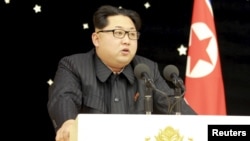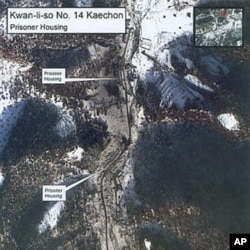Widespread and systematic human rights abuses in North Korea continue despite two years of intense efforts by the United Nations to pressure the Kim Jong Un government to change, a new report by a Korean human rights organization found.
The report released this week by the Database Center for North Korean Human Rights (NKDB) was based on interviews with thousands of North Korean defectors who now live in South Korea.
The finding of over 50,000 cases of human rights violations in North Korea is not verifiable and could be overstated, as it includes not only what witnesses have directly experienced and observed, but also what they have heard from others.
Still it provides rare insight and documents extensive testimony to support its conclusion that conditions in the secretive and repressive North Korean state have not improved since 2014, when the United Nations released an investigative report documenting a network of political prisons camps in the country and widespread atrocities comparable to what the Nazis did before and during World War II
“The [U.N. Commission of Inquiry on Human Rights in the Democratic People’s Republic of Korea] report actually had a very restricted influence overall and we do not see any significant improvement,” said Yoon Yeo-sang, the Chief Director of NKDB’s North Korean Human Rights Archives.
The international community has tried to pressure the Kim leadership to make reforms and hold perpetrators of atrocities accountable, or face escalating penalties and eventual prosecution.
Based on the Commission of Inquiry report, the U.N. General Assembly voted to refer North Korea to the International Criminal Court on charges of crimes against humanity. However, the measure has still not been brought to a vote in the Security Council, given the near certainty that North Korea allies Russia and China would veto it.
Arrests and executions
The NKDB report said arbitrary arrests and imprisonments accounted for almost half of the 53,000 human rights violation cases they documented.
Witnesses said violations that led to detentions by the state security officers included attempting to escape from the North and trying to communicate with relatives in the South. And, families of offenders would often also be arrested.
Since North Korean leader Kim Jong Un took office in late 2011, the NKDB reports, nearly 100 government and military officials have been killed in either public or secret executions.
The NKDB says it is unclear if the recent purges among the Pyongyang leadership indicate the young North Korean leader is a brutal despot, or that an internal power struggle has forced him to take harsh measures.
“We can see after Kim Jong Un’s assent to power there have been a number of internal political problems within the country, that actually prevented any policies that might have been aimed at improving the human rights situation,” Yoon said.
Worse a decade ago
While there are still a significant number of reported violations, in some human rights categories, the number of cases has dropped in the last decade.
“Torture and inhumane treatment peaked in the 2000s but still occur at a consistent rate,” said Yoon.
And even though poverty is widespread, Yoon said, no North Korean has died from starvation in recent years, due in part to agricultural reforms that give farmers more incentives and increase private market trade with China.
Severe famines in the 1990s that killed more than three million North Koreans were made worse by the communist government’s restrictive agricultural system and a sudden halt in economic aid after the collapse of the Soviet Union.
The new U.N. sanctions imposed on North Korea in March for conducting its fourth nuclear test and another long-range rocket launch this year, did not mention the country’s human rights violations.
China’s support for sanctions is considered crucial because of its close economic ties with North Korea, and Beijing most likely would have opposed any focus on human rights abuse given its own record of, according to critics, unlawful harassment, imprisonment and torture.
However new U.S. unilateral sanctions imposed on North Korea did cite human rights violations, as well as nuclear proliferation, as justifications for the punitive measures.
In March, South Korea also passed legislation that will make improving human rights conditions across the border part of any humanitarian aid program, and will document rights abuses by the North Korean government and its leaders.
Youmi Kim in Seoul contributed to this report.








